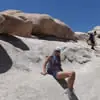Camping without a tent is the ultimate way to experience the outdoors. For backpackers, this eliminates a heavy item to carry. For outdoors lovers, it's another way to remain totally in touch with nature.
"Having no roof above your head in the outdoors also provides you with a unique sense of freedom, and makes you part of nature," says Sean McNally of LiveOutdoors.com. "There are some things that you simply can't experience within a tent, such as the first warmth of a sunrise, or the dazzling display of stars that never cease to amaze even the most seasoned campers."
1. Choose the Right Location
When camping without a tent, it's important to be prepared for anything and everything. To be sure you can sleep safely and comfortably, research the following:
Weather: Without shelter you have no protection from the elements, whether it's rain, wind or extreme heat with little to no shade. Plan your trip at the most temperate time of year for the location you want to visit. Late spring and summer is ideal in most regions of the U.S.
Wildlife: Check with local authorities about wildlife in the area. There may be places that are safer for sleeping than others, within the same area. In general established campgrounds or state parks, patrolled by security or campground managers, are the safest places to sleep.
Wilderness: According to the Leave No Trace Center for Outdoors Ethics, there are a number of ways you can lower your impact on the wilderness when camping. This is especially important if you camp without a tent on a backcountry trip because this land is often less trekked and in good condition. In general, don't go during times of high use and know the local regulations.



